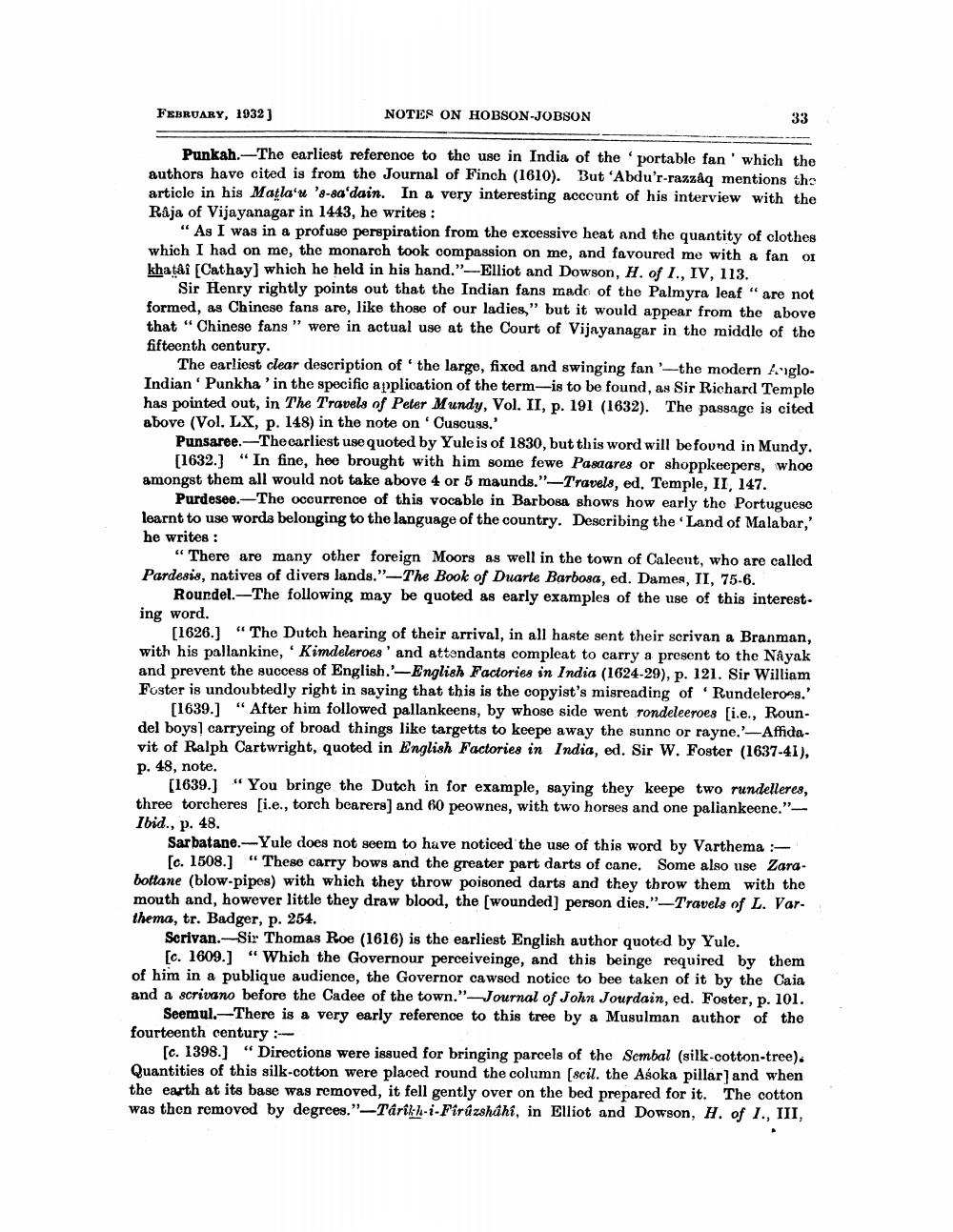________________
FEBRUARY, 1932)
NOTES ON HOBSON-JOBSON
Punkah.-The earliest reference to the use in India of the portable fan' which the authors have cited is from the Journal of Finch (1610). But Abdu'r-razzaq mentions the article in his Matla'u '8-8a'dain. In a very interesting account of his interview with the Raja of Vijayanagar in 1443, he writes :
"As I was in a profuse perspiration from the excessive heat and the quantity of clothes which I had on me, the monarch took compassion on me, and favoured me with a fan of khatai (Cathay) which he held in his hand.”-Elliot and Dowson, H. of I., IV, 113.
Sir Henry rightly points out that the Indian fans made of the Palmyra leaf "are not formed, as Chinese fans are, like those of our ladies," but it would appear from the above that “ Chinese fans" were in actual use at the Court of Vijayanagar in the middle of the fifteenth century.
The earliest clear description of the large, fixed and swinging fan '--the modern AngloIndian Punkha 'in the specific application of the term-is to be found, as Sir Richard Temple has pointed out, in The Travels of Peter Mundy, Vol. II, p. 191 (1632). The passage is cited above (Vol. LX, p. 148) in the note on Cuscuss.'
Punsaree.-Thecarliest use quoted by Yule is of 1830, but this word will be found in Mundy.
[1632.] “In fine, hee brought with him some fewe Pasdares or shoppkeepers, whoe amongst them all would not take above 4 or 5 maunds."-Travels, ed. Temple, II, 147.
Purdesee.-The occurrence of this vocable in Barbosa shows how early tho Portuguese learnt to use words belonging to the language of the country. Describing the Land of Malabar.' he writes :
“There are many other foreign Moors as well in the town of Calecut, who are called Pardesis, natives of divers lands."-The Book of Duarte Barbosa, ed. Dames, II. 75-6.
Rourdel.-The following may be quoted as early examples of the use of this interest. ing word.
[1626.) "The Dutch hearing of their arrival, in all haste sent their scrivan a Branman, with his pallankine, Kimdeleroes' and attendants compleat to carry a present to the Nayak and prevent the success of English.' - English Factories in India (1624-29), p. 121. Sir William Foster is undoubtedly right in saying that this is the copyist's misreading of Rundeleroes.'
11639.) "After him followed pallankeens, by whose side went rondeleeroes [i.e., Roundel boys! carryeing of broad things like targetts to keepe away the sunne or rayne,' - Affidavit of Ralph Cartwright, quoted in English Factories in India, ed. Sir W. Foster (1637-41), p. 48, note.
(1639.) "You bringe the Dutch in for example, saying they keepe two rundelleres, three torcheres [i.e., torch bearers) and 60 peownes, with two horses and one paliankeene."Ibid., p. 48.
Sarbatane. Yule does not seem to have noticed the use of this word by Varthema :
[c. 1508.) "These carry bows and the greater part darts of cane. Some also use Zarabottane (blow-pipes) with which they throw poisoned darts and they throw them with the mouth and, however little they draw blood, the (wounded) person dies."-Travels of L. Var. thema, tr. Badger, p. 254.
Serivan.-Sir Thomas Roe (1616) is the earliest English author quoted by Yule.
[c. 1609.) “Which the Governour perceiveinge, and this beinge required by them of him in a publique audience, the Governor cawsed notice to bee taken of it by the Caia and a scrivano before the Cadee of the town."-Journal of John Jourdain, ed. Foster, p. 101.
Seemul. There is a very early reference to this tree by a Musulman author of the fourteenth century :
[c. 1398.) "Directions were issued for bringing parcels of the Sembal (silk-cotton-tree). Quantities of this silk-cotton were placed round the column (scil. the Asoka pillar) and when the earth at its base was removed, it fell gently over on the bed prepared for it. The cotton was then removed by degrees."-Tarikh-i-Firúzsháhi, in Elliot and Dowson, H. of I., III,




